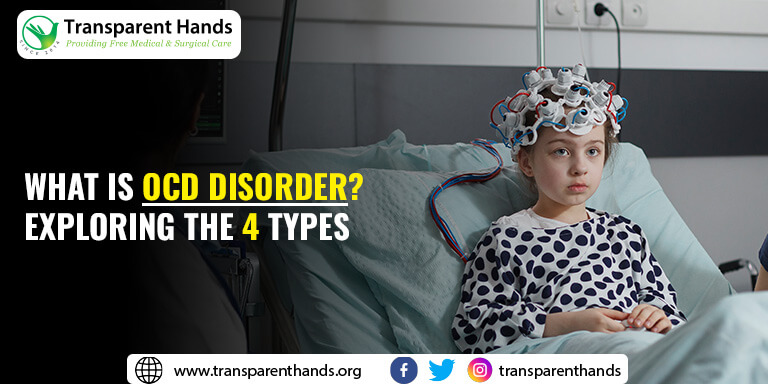What is OCD Disorder? Exploring the 4 Types

Obsessive-Compulsive Disorder (OCD) is a complex and often debilitating mental health condition that affects millions of people worldwide. It is characterized by the presence of recurring intrusive thoughts (obsessions) and repetitive behaviors or rituals (compulsions). These obsessions and compulsions can consume a significant amount of time, cause distress and anxiety, and interfere with daily life, relationships, and overall well-being.
Living with OCD disorder can be challenging, as individuals may feel trapped in a cycle of uncontrollable thoughts and ritualistic behaviors. The condition can significantly impact various aspects of their lives, including work, school, personal relationships, and emotional well-being. Understanding the nature of OCD, its symptoms, and the different types it manifests in is essential for both individuals living with OCD and those supporting them.
What is OCD Disorder?
Obsessive-Compulsive Disorder (OCD) is a chronic mental health disorder characterized by the presence of obsessions and compulsions. Obsessions are intrusive thoughts, urges, or mental images that recur persistently and cause distress. These thoughts often revolve around themes such as contamination, symmetry, forbidden or aggressive impulses, and concerns about safety or harm to oneself or others.
Compulsions, on the other hand, are repetitive behaviors or mental acts that individuals engage in to alleviate the anxiety and distress caused by their obsessions. These behaviors are typically aimed at preventing a feared outcome or reducing the anxiety associated with obsessive thoughts. However, the relief provided by these rituals is temporary, leading to a perpetuation of the cycle.
The Symptoms of OCD:
The OCD symptoms can vary in intensity and frequency among individuals. However, there are common manifestations that characterize the disorder. Some of the key symptoms of OCD include:
- Intrusive and unwanted thoughts or images that cause significant anxiety or distress.
- Repetitive behaviors or mental acts performed in response to the obsessions are aimed at reducing anxiety or preventing a feared outcome.
- Feeling compelled to engage in specific rituals or routines, even when they are excessive or irrational.
- Experiencing distress or frustration when unable to perform the rituals or resist the obsessions.
- Significant time spent on obsessions and compulsions, which interferes with daily functioning and normal activities.
What is an Obsession?
Obsessions in OCD disorder are intrusive and persistent thoughts, urges, or mental images that cause distress. These thoughts may go against an individual’s values, beliefs, or desired behavior, leading to heightened anxiety. Common obsessions include fears of contamination, concerns about symmetry or exactness, intrusive thoughts related to harm or violence, and excessive worries about order or organization.
What is Considered OCD Behavior?
OCD behaviors refer to the repetitive actions or rituals that individuals with OCD engage in to alleviate anxiety or prevent perceived harm. These behaviors can be physical, such as excessive hand washing, cleaning, checking, or arranging objects. They can also be mental, involving repetitive counting, praying, or mentally reviewing events to counteract the distressing thoughts. The performance of these behaviors temporarily reduces anxiety but reinforces the OCD cycle.
The Four Types of OCD:
OCD can manifest in various forms, often categorized into four main types:
Contamination and Cleaning OCD
This type involves an excessive fear of contamination by germs, dirt, or harmful substances. Individuals may engage in cleaning rituals, such as frequent handwashing, disinfecting surfaces, or avoiding contact with certain objects or environments.
Checking OCD
People with checking OCD disorder have persistent fears of harm, danger, or disasters. They engage in repetitive checking behaviors to ensure that potential threats, such as locked doors, turned-off appliances, or potential accidents, are secure. These checking rituals can be time-consuming and interfere with daily activities.
Symmetry and Ordering OCD
This type revolves around an intense need for symmetry, exactness, or order. Individuals may feel distressed by asymmetrical or disordered arrangements and feel compelled to align objects, arrange items in specific patterns, or follow rigid routines. Deviation from the desired order can cause significant anxiety.
Intrusive Thoughts and Rumination OCD
This type is characterized by recurrent intrusive thoughts of a disturbing nature, often related to harmful, sexual, or violent content. Individuals may experience unwanted and distressing thoughts or mental images that conflict with their personal values or beliefs. They may engage in mental rituals, such as repetitive praying, counting, or mentally reviewing events, to counteract these distressing thoughts.
What causes OCD in the brain?
The exact causes of OCD are not yet fully understood. However, research suggests that OCD is likely influenced by a combination of genetic, environmental, and neurobiological factors. Neurotransmitters, particularly serotonin, have been implicated in the development and maintenance of OCD symptoms. Structural and functional differences in specific brain regions, such as the orbitofrontal cortex, anterior cingulate cortex, and basal ganglia, have also been observed in individuals with OCD.
Conclusion:
Obsessive-Compulsive Disorder (OCD) is a complex mental health condition characterized by intrusive thoughts (obsessions) and repetitive behaviors (compulsions). Understanding the symptoms and types of OCD disorder is crucial for early recognition, diagnosis, and appropriate treatment. While the precise causes of OCD are still being explored, ongoing research provides insights into the neurobiological and environmental factors contributing to the disorder. Seeking professional help from a mental health specialist is essential for accurate diagnosis and the development of an effective treatment plan for individuals living with OCD.










Leave Your Comments